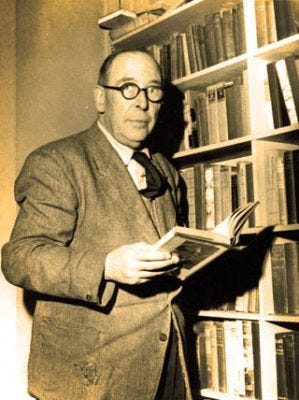A Flannery O'Connor Advent
Week 3: Joy, Longing, and the Hallelujah Bridge
“… that we be not as strangers in the province of joy.”1
In 1973 I fell hard for Maddy Prior, lead vocalist of the curiously named British folk band Steeleye Span. The song of hers that especially enchanted me was, of all things, a sixteenth-century Christmas anthem “Gaudēte” or “Rejoice.” I listened to it over and over. I couldn’t get enough of it. I still can’t.
What I’ve come to appreciate with the passage of years is that what originally felt like a fanboy crush on a performer was actually something much deeper. What really attracted me was the beautifully disincarnate purity of Maddy’s voice and the celebratory message of Gaudēte’s lyrics. Both took me out of myself. Both stirred in me a chthonic longing that I can only characterize as a kind of homesickness.
That longing, that homesickness, is joy, the third gift of the Advent season. How appropriate that it would’ve been awakened in me by an anthem called Gaudēte!2
To think of joy as longing runs afoul of conventional wisdom, doesn’t it? We typically consider joy to be a state of happy fulfillment or pleased completion: I’ve found what I’ve been looking for. Therefore I’m joyful. Joy is the destination, not the desire that makes you want to get there.
But C.S. Lewis—and, I believe, Flannery O’Connor—think otherwise. For them, joy is the yearning for fulfillment that draws us towards what in fact will fulfill us by teasing us with a foretaste of it. Their understanding of joy reminds me a bit of Catherine of Siena’s famous “All the way to heaven is heaven” or Pascal’s imagining God saying to him “You would not seek me had you not already found me.”
In his remarkable sermon “The Weight of Glory,” Lewis contends that if we concede that “we are made for heaven,” then “the desire for our proper place will be already in us.” In other words, the yearning that feels like homesickness for a “far-off country” is hardwired into us.3
We frequently think that a beautiful piece of music or beloved poem that moves us is the thing we longingly seek. But, counters Lewis,
“it was not in them, it only came through them, and what came through them was longing […] They are not the thing itself; they are only the scent of a flower we have not found, the echo of a tune we have not heard, news from a country we have never yet visited […] If a transtemporal, transfinite good is our real destiny, then any other good on which our desire fixes must be in some degree fallacious, must bear at best only a symbolical relation to what will truly satisfy.”4
Elsewhere, Lewis explicitly calls this longing, this “unsatisfied desire which is itself more desirable than any other satisfaction,” joy.5 Joy is never a “possession.” Instead, it’s that itchy reminder of a far-off country, a “pointer to something other and outer”6 that prods us in the direction of true north by incessantly whispering “‘It is not I. I am only a reminder. Look! Look! What do I remind you of?’”7
And what is it that joy reminds us of? In a word, God, the Summum Bonum, the Ultimately Desirable. When we catch glimpses of The Divine in finite and temporal beauty, we shiver with awed longing—with joy—because that which we truly crave, that which we sense will genuinely fulfill us, has brushed our hearts. Once tasted, twice yearned for. The trick is not to confuse the joy with that for which it yearns. As Zen Buddhists say, don’t focus on the finger pointing at the moon instead of the moon itself.
Flannery O’Connor’s characters display plenty of longing, although most of the time, in all honesty, it’s more like unwelome torment than Lewis’ “unsatisfied desire which is itself more desirable than any other satisfaction.” The Misfit in “A Good Man is Hard to Find” so pines for the Jesus-story to be true that his inability to believe it poisons his life. The child’s longing for transformative love in “The River” leads to his drowning. In Wise Blood, Hazel Motes’ complicated yearning for God eventually compels him to burn out his eyes.
But in her posthumously published short story “Revelation,” one of her very best, O’Connor offers us a character, Mrs. Turpin, who does seem to experience the kind of longing Lewis calls joy. The reader has every reason to believe that it’s a turning point in her life.

Mrs. Turpin is an incredibly self-satisfied woman, convinced that God has made her just right in every way. “If it’s one thing I am,” she proclaims at one point, “it’s grateful. When I think who all I could have been besides myself and what all I got, a little of everything, and a good disposition besides, I just feel like shouting, ‘Thank you, Jesus, for making everything the way it is! I could have been different! Oh thank you, Jesus, Jesus thank you!’”8
Mrs. Turpin offers her self-appraisal to a captive audience of sick folks in a doctor’s waiting room. Some are from Mrs. Turpin’s own social class, others belong to the group she disdainfully dismisses as white trash. But regardless of their rank in the social pecking order, Mrs. Turpin is happy to let them all know what an exemplary Christian woman she is. She’s such a good Christian, in fact, that she sometimes lies awake at night imagining Jesus speaking to her.
“When she couldn’t go to sleep, Mrs. Turpin would occupy herself with the qustion of who she would have chosen to be if she couldn’t have been herself. If Jesus had said to her before he made her, ‘there’s only two places available for you. You can either be a n****r or white-trash,’ what would she have said? ‘Please, Jesus, please,’ she would have said, ‘just let me wait until there’s another place available,’ and he would have said, ‘No, you have to go right now and I have only those two places so make up your mind.’ She would have wiggled and squirmed and begged and pleaded but it would have been no use and finally she would have said, ‘All right, make me a n****r then—but that don’t mean a trashy one.’ And he would have made her a neat clean respectable Negro woman, herself but black.”9
The passage is classic O’Connor: a shocking insight into human failing (in this case pride and racism) expressed in dark but unmistakable humor. Mrs. Turpin is one of those unfortunates so ridiculously content with her self-image that she can’t see how truly awful it is. Her opacity is both risible and disturbing.
But one of the waiting room’s patients, a young woman home from college who’s been trying to read a book entitled Human Development during Mrs. Turpin’s self-congratulatory soliloquy, is neither edified nor amused. Increasingly infuriated, she suddenly snaps, hurls her book at Mrs. Turpin, and then lunges for her throat.“Go back to hell where you come from, you old wart hog!”10
Although she doesn’t know it, the shaken Mrs. Turpin has just been struck by grace—as O’Connor characteristically says in one of her letters, “grace changes us and the change is painful”11—and the human/spiritual development she so badly needs has been kick-started.
Her initial response to the shock to her self-image as one of the Lord’s favorites is to dig in her heels and resist. Returning home, she goes on the offensive. Like a lachrymose, furious Job, she lets Jesus have it. “‘What do you send me a message like that for?’ she said in a low fierce voice, barely above a whisper but with the force of a shout in its concentrated fury. ‘How am I a hog and me both? How am I saved and from hell too? […] Who do you think you are?’”12
This raised-fist defiance is itself a kind of unconscious longing, isn’t it? Mrs. Turpin, bewildered by the possibility that she may not be the apple of her Father’s eye after all, is a tearful child yearning to be loved, reassured, and comforted. Hard to call this kind of longing joyful.
But that soon changes as the transformative power of grace does its work. Standing outside at sunset, spent by her anger and, for once, in a wordless reverie, Mrs. Turpin gazes upward at a purple streak cutting through the sky like a highway. “A visionary light settled in her eyes. She saw the streak as a vast swinging bridge extending upward from the earth through a field of living fire. Upon it a vast horde of souls were rumbling toward heaven.”13
As she watched the procession, she saw that it was led by the very white trash and black folks she believed to be her inferiors. They were ecstatically happy, “shouting and clapping and leaping like frogs.” At the rear of the procession were all the prim and proper Christians, people like herself who thought a great deal of themselves. To her amazement, “she could see by their shocked and altered faces that even their virtues”—or at least what they’d always taken to be virtues—“were being burned away.”14
This fleeting vision is the moment, I believe, when grace opens up the smugly narrow, ego-centered Mrs. Turpin to Lewis’ “other and outer.” Afterwards, how can she not long for that upside-down distant land in which, she now finally realizes, the first shall be last and the last first? How could she not know that this newly-felt longing reveals, as Lewis says, her “real destiny,” and that the other things she’s desired all her life—social standing, reputation, material goods—were mere distractions?
Typical of her story-telling style, O’Connor refuses to tie up her tale with a happily-ever-after bow. We readers don’t know for sure what happens to Mrs. Turpin after her other and outer experience. But neither are we entirely clueless, because we’re told that as she walked back to her house, “the voices of the souls climbing upward into the starry field and shouting hallelujah” sang in her heart.15
A couple of weeks before she died in August 1964, O’Connor shared a prayer that meant a lot to her with one of her correspondents. One of its petitions was “that we may not be as strangers in the province of joy.” After seeing the hallelujah bridge, I believe that Mrs. Turpin was no longer a stranger to that mysterious yearning called joy. On this third Sunday of Advent, may we, too, not be as strangers to that same holy homesickness and blessed longing. Gaudēte!
Next Week: A Flannery O’Connor Advent - Advent 4, Love
Flannery O’Connor to Janet McKane (14 July 1964), The Habit of Being: Letters of Flannery O’Connor, (ed) Sally Fitzgerald (New York: Farrar, Straus and Giroux, 1979), p. 592.
The full Latin text and English translation of the anthem:
Gaudēte, gaudēte!
Chrīstus est nātus
Ex Marīā virgine,
gaudēte!
Rejoice, rejoice!
Christ is born
Of the Virgin Mary,
Rejoice!
Tempus adest grātiae
Hoc quod optābāmus,
Carmina laetitiae
Dēvōtē reddāmus.
The time of grace has come,
What we have wished for;
Songs of joy
Let us give back faithfully.
Deus homō factus est
Nātūrā mirante,
Mundus renovātus est
Ā Chrīsto regnante.
God has become man,
With nature marvelling,
The world has been renewed
By the reigning Christ.
Ezechiēlis porta
Clausa pertrānsītur,
Unde lūx est orta
Salūs invenītur.
The closed gate of Ezekiel
Is passed through,
Whence the light is risen;
Salvation has been found.
Ergō nostra cōntiō
Psallat iam in lūstrō;
Benedīcat Dominō:
Salūs Regī nostrō.
Therefore, let our assembly
Now sing in brightness
Let it bless the Lord:
Greetings to our King.
C.S. Lewis, “The Weight of Glory,” in The Weight of Glory and Other Addresses (New York: Macmillan, 1949), pp. 3, 4.
Ibid., pp. 4-5.
C.S. Lewis, Surprised by Joy: The Shape of My Early Life (Orlando, Fl: Harcourt Brace Jovanovich, 1955), pp. 17-18.
Ibid., p. 238.
Ibid., p. 220.
Flannery O’Connor, “The Revelation,” in The Complete Stories (New York: Noonday Press, 1999, p. 499.
Ibid., p. 491.
Ibid., p. 500.
Flannery O’Connor to Cecil Dawkins (9 December 1958), The Habit of Being, p. 307. To make sure readers don’t miss the point, O’Connor named the young woman Mary Grace. Her hurling of the Human Development book suggests that Mrs. Turpin is badly in need of spiritual growth.
“The Revelation,” p. 506.
Ibid., p. 508.
Ibid.
Ibid., p. 509.






I love the idea of being "struck by grace" at a time when being so "self-satisfied" and then brought down a peg or two. God must have a great sense of humor - one that we share in best when we can laugh at ourselves? And hear “the voices of the souls climbing upward into the starry field and shouting hallelujah” in our hearts, too. Thanks for this.
Hi Kerry,
I've just received your Flannery O'Connor Advent post for Week 3. Loved it! Thank you.
I've gone back looking through my email and I found Week 2, but do not find Week 1 in my Inbox. Is it possible for you to re-send it? Or maybe I can somehow use this app to see it???
Blessings of the Season,
Therese